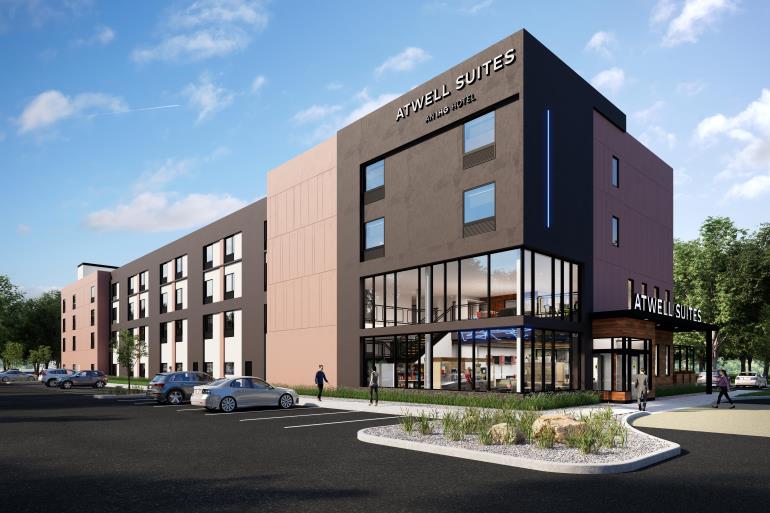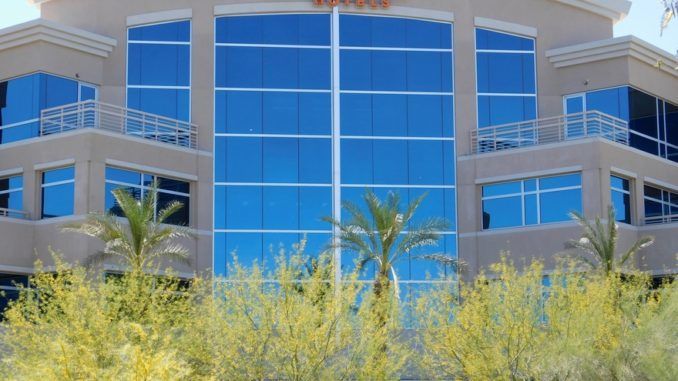Abilene Industrial Foundation pays $75,000 for Doubletree hotel franchise application.
An artist rendering of the convention center hotel that has been proposed for downtown Abilene. (Photo: Gossman Group)

Brian Bethel, Abilene Reporter-News Published 4:00 p.m. CT March 27, 2019
The Abilene Industrial Foundation has invested nearly $170,000 in private resources to assist the city of Abilene in its quest for a downtown hotel, Abilene Chamber of Commerce president Doug Peters said this week.
That total includes $75,000 to serve as the project's franchise application fee to Hilton Hotels for a DoubleTree franchise.
Based on two separate market studies, "we believe that this hotel project will not only benefit downtown, but will also generate additional hotel business that benefits all the hotels," Peters said. The AIF board's decision represents a continuation of partnerships held with the city for nearly three years.
The Abilene City Council will vote Thursday to form the Abilene Convention Center Hotel Development Corporation, a nonprofit entity that would own the hotel.
Paying for itself
"(The) council will vote ... to stand up the local government corporation, which is a public-private partnership that will own the hotel," Peters said. "They will enter into an operating agreement with a hotel operating company."
Approvals recently have come back from the state, including an opinion by the state attorney general's office, Peters said, "that the proposed structure of ownership by a local government corporation" will satisfy requirements.
That would allow Abilene to apply revenues the hotel generates toward the cost of building it.
"We would hope that sometime in in the summer, there could be a ceremonial groundbreaking," he said. "There would be a period of time where the pre-development work is taking place, which is the architectural work, the design, the schematics, the utility planning and placement, site prep, (and) taking down that old utility building that the city uses there on that block."
The office will be relocating to the former Kmart site in west Abilene, where a new Abilene Police Department will be headquartered.
"Ultimately, my hope is that we could have a hotel standing in our downtown, roughly 24 to 36 months from that date," Peters said.
Multi-step process
It would be the end of what has been a long process, Peters said, that includes requiring passage of legislation that would allow Hotel Occupancy Tax generated by the hotel to pay for the project.
That in turn created a two-year period to "to get our program together to qualify for those funds" and make certain that "we're building the very best possible business model so that there is no tax implication on the back of Abilene taxpayers."
And then, there has been the process of "negotiating the flag" the hotel will bear, he said.
"Whether it's a Hilton or Marriott or whatever, all those things take time," he said. "So my big fear through this whole process has been what I call deal fatigue. People hear this, the promise of something over and over and over, but it never seems to happen.
"People just get tired of hearing about it."
But with the steps the council is taking Thursday, and other steps that have led to this point, the deal that Peters called "the single most complicated" in his 33 years of professional experience is closer to coming to fruition.
"There is not one piece of this, that has not been very thoroughly thought out," he said. "... I think it's going to exceed the community's expectation, both from its structure, what it will do from a catalytic perspective, and then certainly, what it will do to to help drive additional investment and growth, not just in the downtown, but all across our community."
Long-term goals
The revitalization of downtown has long been seen as an amenity that will inspire younger people to want to live in Abilene and be a part of the workforce, "which we know we have to have in order to attract industry and jobs for everybody," Peters said.
The hotel project — which would be funded through a mix of around $40 million in private investment, a $7 million local private sector donation, some remaining Tax Increment Financing funds and the HOT dollars — is not designed to make any one person rich.
“"We want to be able to go out across Texas, across the southwest and really anywhere, and encourage groups of 100 to 400 and even more to hold their conventions here so that it benefits everybody in this community."”
Doug Peters, president Abilene Chamber of Commerce
"City Council members are still going to get paid the same $1 a year whether this hotel is built or not," Peters said,. "They're not going to make a nickel more off of it. And I can tell you that the chamber doesn't benefit.
"But who does benefit is the entire community, particularly those who do business in this community."
Two different hotel market assessment companies came to similar conclusions about the project, Peters said. That has fostered belief that the project will benefit not just create development downtown but should also generate "additional hotel business that benefits all the (city's) hotels."
That information, and the longtime partnership with the city, prompted the AIF board to spend the $75,000 in private funds for the application to Hilton, Peters said.
Investment in community
The Abilene Industrial Foundation is a decades-old industrial recruiting and retention arm of the community and it a function of the Chamber, he said.
"It is private and membership-based, and is comprised of industry leaders, community and civic leaders, and those who want to see our community grow and prosper for the betterment of all of Abilene," he said.
Each year, these companies invest in the work of the Abilene Industrial Foundation, such as during a recent fund drive last fall.
"The funds invested by the members of the AIF are used to drive economic development in our community," Peters said.
Those pooled funds are used to pursue opportunities that are not typically within the scope of work of the Development Corporation of Abilene, Abilene’s 4A sales tax entity.
"Because the DCOA’s interests are largely focused on industry recruitment, retail, commercial, office and special projects fall to the Chamber’s AIF," Peters said.
It is up to the members of the AIF to choose to invest that private money, from the AIF’s opportunity fund, into projects that have potential to advance the economic interests of Abilene.
"The members of the AIF understand the value and long-term impact a catalytic project of this nature can have on Abilene, and thus have supported it from the beginning because they know that a vibrant downtown is good for all of Abilene, not just one person or one group of people," Peters said.
There are "very few" communities Abilene's size, Peters said, that have the market that will support the development and operation of a full-service convention hotel.
"And that's really what we wanted, because we want to be able to go out across Texas, across the Southwest and really anywhere, and encourage groups of 100 to 400 and even more to hold their conventions here so that it benefits everybody in this community," he said.
That benefit should ripple out, he said, "whether you're working in fast food and you're serving these people as they're coming into the community, or you're selling flowers that are then used to decorate the tables when these folks have their their events here."
"That product does not exist, and that's why it requires a creative approach to getting it done," he said.
About DoubleTree
The first DoubleTree location opened in Scottsdale, Arizona, in 1969. The company began franchising in 1989, and 10 years later twas acquired by Hilton Hotels Worldwide.
In 2011, it was rebranded DoubleTree by Hilton.
DoubleTree today has more than 500 hotels in 40 countries and territories. It competes in the "full-service" hotel industry alongside its sister chain Hilton Hotels & Resorts

IHG® (InterContinental Hotels Group), one of the world’s leading hotel companies, announces today that it has launched franchise sales efforts for its newest brand – Atwell Suites™ – in the U.S. The new upper-midscale hotel brand targets an estimated $18 billion industry segment which has grown by 70 percent over the last four years. Atwell Suites was first unveiled in May 2019 to thousands of IHG owners and operators at its Americas Investors & Leadership Conference in Las Vegas. Elie Maalouf, Chief Executive Officer, Americas, IHG, commented: “IHG’s brands are known and loved around the world, with the Americas region serving as the birthplace of the Holiday Inn and Holiday Inn Express brands, as well as avid hotels – the fastest brand launch in our history. The Atwell Suites brand builds on this track record of growth, value and innovation for owners, while offering guests something truly distinct in the growing upper-midscale segment.” The Atwell Suites brand is designed for a new type of guest who is seeking opportunities to discover, learn and grow as they travel – perhaps even extending their stay a few days to explore a destination. IHG designed Atwell Suites for this new generation of travelers, integrating flexibility throughout the property with spaces and programs that encourage social interaction and help foster a spirit of kinship among guests. Jennifer Gribble, Vice President, Atwell Suites, IHG, commented: “We used extensive consumer research and insights, as well as close collaboration with our existing owners, to create Atwell Suites as a unique brand that is both efficient for owners and inspiring for guests. We’re excited to bring a new brand to the marketplace that creates an environment where guests can be at their most inspired, most productive and most rested.” IHG today also released new Atwell Suites renderings, further illustrating how the brand is designed to bring inspiration to every journey. The exterior design for Atwell Suites properties creates a distinctively modern and welcoming first impression for guests, with interest from all angles thanks to a mix of neutral tones and textures. Windows frame the two-story lobby, acting as an intriguing reveal of the brand’s shared spaces and an encouraging invitation to come inside. The lobby space mixes private and shared areas to perfectly suit guests’ transition from work to leisure – creating a comfortable, welcoming feel any time of day. The reception area and bar are the central elements of the brand’s first-floor shared space and evolve seamlessly throughout the day. The lobby’s double height space is open to the second floor, bringing in lots of natural light for a fresh, airy feel, with the open stair connecting the first-floor lobby to the second floor, and inviting guests upward. IHG also expects to share more information on a one-story lobby solution for owners in November 2019. Signature features of the Atwell Suites brand include: All-studio suites: Atwell Suites properties will offer all-studio suites which include distinct zones for living and sleeping; a wet bar with undercounter refrigerator, microwave, coffeemaker and bar sink; a work area with a high-top desk; a pull-out sofa; an oversized vanity in the bathroom; and a two-sided closet that can be easily accessed from both the guestroom and the bathroom. Spaces to connect and collaborate: Guests will be able to easily move from their rooms to public spaces in order to relax, work, collaborate and create connections in whatever way works best for them. Atwell Suites’ design allows guests to create their own environment with more flexible meeting spaces – including a flexible meeting room integrated into the second floor of the lobby, outdoor space, huddle areas and public/private working spaces. “Golden Hours” F&B: Atwell Suites properties will offer F&B options for when the sun is coming up and going down. All hotels will offer a complimentary hot breakfast that will feature two to three rotating signature hot items alongside a variety of morning favorites, as well as premium coffee and espresso. Additionally, guests may enjoy a paid bar in the lobby at the end of the day that will serve small plates of cravable items such as dips, tacos and flatbreads, paired with a drink menu featuring beer, wine and cocktails. Atwell Suites properties will feature the latest technology solutions to power the guest experience, including IHG's industry-leading in-hotel Wi-Fi, IHG® Connect. The brand will also offer IHG® Studio, a seamless direct casting of entertainment from guests' smart phones and personal devices to 55" TVs in each room. Atwell Suites is a strong complement to IHG's established brands, offering an average daily rate within the upper-midscale price point. Atwell Suites properties can be developed in any market and will be efficient to build, operate and maintain – consistent with the company’s commitment to a positive owner experience for all of its brands. Additionally, Atwell Suites’ efficiently designed building and operating model will minimize the number of employees required to provide exceptional service for hotel guests. With initial development focused in the U.S. market, the brand will be predominantly new-build following a prototypical design, with conversions also being considered on a case-by-case basis. In August, IHG announced that it had received more than 50 expressions of interest from owners in developing the Atwell Suites brand just a few months following the brand’s launch. IHG expects the first Atwell Suites locations to begin construction in early 2020 and open in 2021. The offer available from IHG includes: Target build cost between $105k – $115k per key (excluding land costs), with estimated site size of two acres 5% royalty fee 4.75% loyalty rate License agreements which are signed before March 2021 will be eligible for a 2% royalty fee discount in year one and 1% royalty fee discount in year two if all opening milestones are achieved To learn more, visit www.atwellsuites.com.

By HTN Staff - 4.30.2019 With the launch of its new Openings Portal, Choice Hotels International is simplifying and improving the process of opening a hotel for its franchisees. The advanced project management platform was designed to let Choice owners track every step of the opening process, from franchise agreement to the first check-in. The ideas is to help owners welcome guests faster and capitalize on their investment sooner. The hope is that the platform’s intuitive design and functionality will help remove friction and create a more seamless process. According to a company spokesperson, Choice’s dedicated Opening Services team will continue to be franchisees’ primary resource during the opening process, and the Openings Portal will supplement the hands-on, personal services, with the following features: Three tracks: critical milestones, brand requirements, and training and activation, where owners can monitor their progress as they complete each step in the hotel’s opening process. Fully mobile functionality so franchisees can update their progress anywhere, at any time. A powerful search feature that quickly guides owners to important documents and valuable educational content, which helps franchisees learn about the opening process and how to help improve profitability. The Openings Portal is housed on Choice University, a premier property-level training resource, which last year was ranked No. 6 in ELearning! Magazine’s Top 100 Companies for Corporate Training. Choice University offers hotel owners a wide range of engaging, relevant content designed to deliver a positive impact across all areas of the business, including a curriculum tailored to each user based on job function and brand. Fully mobile functionality allows franchisees to update their progress anywhere, at any time. The new resource builds on several innovations that Choice Hotels recently created, including Virtual Pay capabilities and the Group Management Platform. Virtual Pay allows travel managers to quickly and effortlessly book stays for their guests without needing a personal credit card, and Group Management Platform is an online reservation solution that makes planning and booking group travel easier. The new tool should help Choice Hotel maintain its industry-leading voluntary franchisee retention rate. The company currently has approximately 2,000 franchisee. It’s not the first time the publicly traded company, which has more than 7,000 hotels in total representing nearly 570,000 rooms as of the end of last year, has demonstrated its technology prowess. In January, for example, the company launched its Group Management Platform, an online reservation platform to make planning and booking group travel at its hotels faster and more efficient. The tool is available to members of the Choice Privileges loyalty program who are looking to book 10 rooms or more.
Using the tool, guests can make reservations for groups, review details at a glance, select various payment options, confirm reservations, send customized emails inviting guests to book and make room modifications at any time. For the past five years, the company has made its hotel property management system available under its SkyTouch Technology subsidiary to any hotelier in the world, including its direct competitors. So far, more than 750 non-Choice hoteliers have become customers. Choice Hotels’ technology leadership position has clearly helped it strengthen its midscale presence while growing its upscale and extended-stay portfolio. Last year, the company expanded its domestic development pipeline to its largest ever and increased its international room count by nearly 6 percent. This post originally found here:

